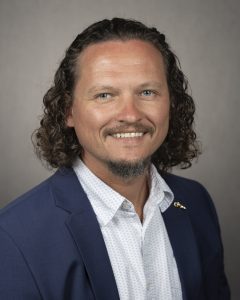Gainesville, FL: University of Florida Assistant Professors Daniel Czyz and Melissa Jones received prestigious recognition as “Future Leaders in the field of host-microbe interactions” from Infection and Immunology, a respected American Society for Microbiology journal.
The journal’s recognition honors promising early-career scientists who show potential as leading researchers in the field of host-microbe interactions. Czyz and Jones were two of fourteen scientists chosen for this recognition in 2023 worldwide. Infection and Immunology published a special collection of mini-review articles authored by these honored scientists.
Professor and Chair Eric Triplett says, “Dr. Czyz and Dr. Jones are doing exciting research as well as being terrific teachers and excellent citizens of the department. Czyz teaches a popular course on antimicrobial resistance and Jones teaches the virology courses for the Department of Microbiology and Cell Science at the University of Florida.”

Czyz and post-doctoral researcher Alyssa Walker authored an article entitled, “Oh my gut! Is the microbial origin of neurodegenerative disease real?”. This review explores the microbial contribution to protein conformational diseases (PCDs) like Alzheimer’s and Parkinson’s and the potential impact of increasing antibiotic resistance. Walker and Czyz emphasize that due to emerging evidence of microbial pathogenesis in PCDs, prescribers should be aware that antibiotics may play a role in contributing to PCD onset and that increased antibiotic resistance will lead to an enrichment of proteotoxic bacterial species.
“The ability to understand individual microbial resistance in PCDs is an emerging field of research,” Czyz said. “We’re interested in finding effective alternatives to antibiotics and preventing and treating neurogenerative diseases.”
 Jones and doctoral researcher Guanqi Zhao authored an article entitled, “Role of Bacterial Extracellular Vesicles in Manipulating Infection”. This review surveys the increasingly important influence bacterial extracellular vesicles (bEVs) have in modulating bacterial and viral infections. Zhao and Jones suggest that bEVs may serve as the primary mechanism through which the microbiome regulates homeostasis.
Jones and doctoral researcher Guanqi Zhao authored an article entitled, “Role of Bacterial Extracellular Vesicles in Manipulating Infection”. This review surveys the increasingly important influence bacterial extracellular vesicles (bEVs) have in modulating bacterial and viral infections. Zhao and Jones suggest that bEVs may serve as the primary mechanism through which the microbiome regulates homeostasis.
“Due to their small size and ability to travel throughout the body, bEVs produced by the intestinal microbiota have the ability to impact infection and immune status within the gut and systemically,” Jones said. “Our goal is to understand the role of these vesicles in controlling immune responses to infection for the purpose of developing novel drugs to prevent and treat disease.”
About UF Microbiology and Cell Science: The Department of Microbiology and Cell Science at the University of Florida is the largest microbiology program in the United States with an enrollment of approximately 1,000 undergraduate majors and over 50 doctoral students. The Department of Microbiology and Cell Science is home to 26 tenure faculty, 10 non-tenure faculty and 11 post-doctoral fellows whose research span the cellular and molecular aspects of bacterial, plant and animal life.
 3
3
